Little Free Libraries: Anthropology on the Front Lawn
For used books fans there is a new communal book exchange: the Little Free Library. What are we, as anthropologists, to make of this back yard libraries in the context of social movements and the sharing economy?
When I was a student, I always bought used books. My main sources were brick-and-mortar book stores, such as De Slegte (remember, they were acquired by a big chain, went bankrupt, and are now back in Leiden), or fellow students, who had probably bought their books secondhand as well. And a few years into my undergrad career, I started relying more on on-line websites. Yet, last year, I found a new, unexpected source of used books right in my own back yard—or more accurately, in my neighbor’s front yard; a “Little Free Library” popped up, right on the front lawn.
“Take A Book, Leave A Book”
Little Free Libraries are exactly what the name suggests: they are, first of all, small: about a meter wide, no more than a book shelf deep, and only one or two shelves high. Second, they operate on the principle of a library, meaning you can borrow books from them to return at a later date; third, they are free, so anyone can borrow books. The idea—which is often spelled out on the library’s sign —is that any passerby can “take a book, leave a book.”
It doesn’t say that the “taking” and “leaving” of a book need to occur at the same time, so you can borrow a book now and return it later, or return a different book. Personally, I tend to use the Little Free Library at my neighbor’s as a book exchange, leaving old books (i.e. that I’ve finished reading) to find new homes with passers-by, in exchange for a book that is new to me.
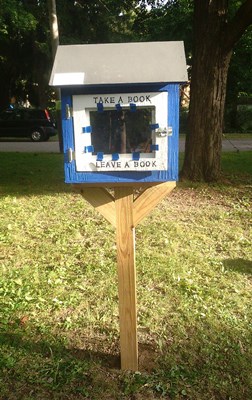
Little Free Libraries Everywhere
Soon after I encountered my first Little Free Library on my neighbor’s front lawn, I found two others in the Dutch town where I live. In the summer, I temporarily moved back to a university town in the United States… and immediately ran into a Little Free Library there too. Over the course of a few short weeks, I found twelve others, including one inside an actual library.
When I was exchanging books at one of them, a woman came up to me and explained that her sister had been the caretaker of this particular Little Free Library. The sister had enjoyed interacting with the kids who had come to get books, or even just seeing them through her window in the final months of her illness. Now, after the sister’s passing, the remaining siblings took comfort in the fact that the library, which had brought their sister such joy, lived on in the neighborhood.
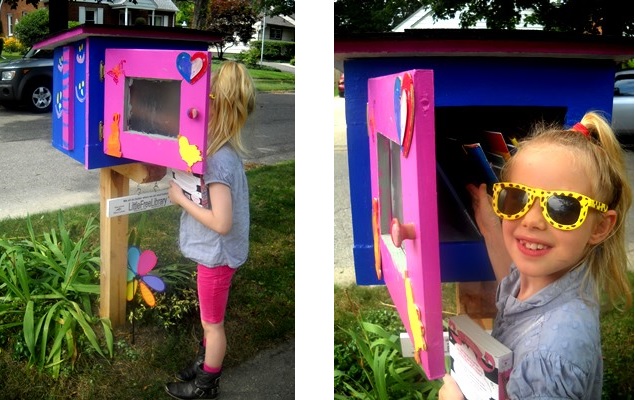
The ‘Sharing Economy’?
What are we, as anthropologists, to make of these Little Free Libraries? They certainly seem to fit in well with the broader phenomenon of the “sharing economy,” which rather imprecisely refers to all manner of ways in which people bypass existing companies and institutional channels to exchange goods and services. Anthropologists—including some who have written on this blog—have been critical of the enthusiasm with which this trend has been hailed, pointing out that “sharing” is a misnomer for many of the forms of exchange that go on under the banner of the new “sharing economy.” Buying and selling is often a more accurate description of the actual practices people engage in, and the bypassing of “vested interests” also means circumventing hard-won safety and labor laws.
It seems unlikely that the libraries threaten the existence of official used book stores. Nor can it easily be argued that the book exchange happening through Little Free Libraries is a disguised form of market exchange – although you can buy a prefabricated Little Free Library if you don’t want to make your own. In fact, the libraries are much more “peer to peer” than most so-called “sharing” initiatives, because they don’t use an intermediary platform (as is the case for Airbnb, Uber, and other examples). Instead of connecting people digitally, Little Free Libraries are physical repositories that serve as resources for people in their more or less immediate vicinity.
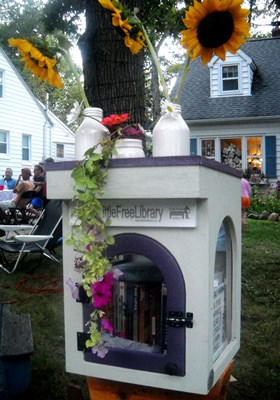
Critical Questions
The limited geographical expanse of the Little Free Library would seem a clear limitation in the attempt to conceive of the phenomenon as a social movement that aims to “bring books to every-body,” “create community”, and have the libraries “function as neighborhood town squares” as the American based non-profit organisation Little Free Library promotes its goals. You have to be there to benefit from the libraries. So far, the Little Free Libraries I’ve encountered have been in places where there are (safe) sidewalks and a neighborhood population that is highly educated, or at least largely literate.
The description by no means fits most neighborhoods worldwide. Nice as it is to have a Little Free Library in my neighbor’s front garden (and that is very nice), I can’t help wondering if it’s only in comfortable neighborhoods like mine that these libraries are so abundant. Though there is no reason that Little Free Libraries shouldn’t thrive in all kinds of neighborhoods, I would love to have more exact data on the existence and density of libraries in different neighborhoods.
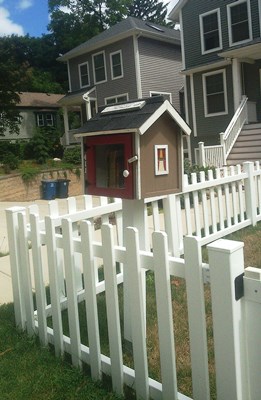
In fact, this would be a great research project. Anthropologists know that efforts to build community frequently end up excluding as many people as they include, so it is worth asking who has access to a Little Free Library and who doesn’t. Who is served by these libraries and who isn’t? Likewise, it might be illuminating to track and compare the collections of books over time at a number of different libraries, or to observe the ways people use the libraries and interact with other users or passers-by. Who reads what, and how does this reading broaden or narrow people’s viewpoints?
TheTransformative Power of Reading
In the absence of research data, my highly unscientific take is that the libraries constitute a small-scale and probably mostly middle-class phenomenon. Unlike, say, Black Lives Matter, the movement seems unlikely to alleviate great social ills such as economic inequality and racism that exist in the US or elsewhere. I’m not sure that they enable us to see these problems if we aren’t already positioned to do so.
Still, I fully agree that books can be powerful factors for change, and a main reason that I—like my fellow Anthro blogger—love reading, is that it widens my imagination to include perspectives and viewpoints that are far removed from my own lived experiences. In that sense, sharing books with one another does seem a promising approach. Similar premises underlie other library-based movements, such as the recent initiative to bring books about feminism to people by means of mobile “libraries on wheels.” Here, it’s the content of the library that’s particularly important. Older programs, too, are premised on the transformative power of reading, books, and libraries, such as the program that brings books to African (mobile) libraries or the one that supplies low-income kids with new books.
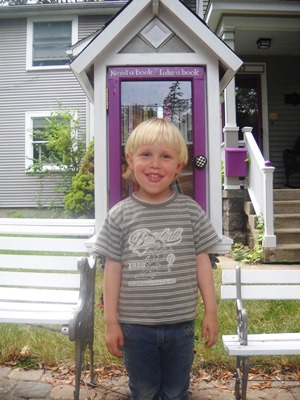
Please let me know in the comments if you know of any Little Free Libraries or similar projects in the Netherlands, or elsewhere. I would love to check them out if I can!


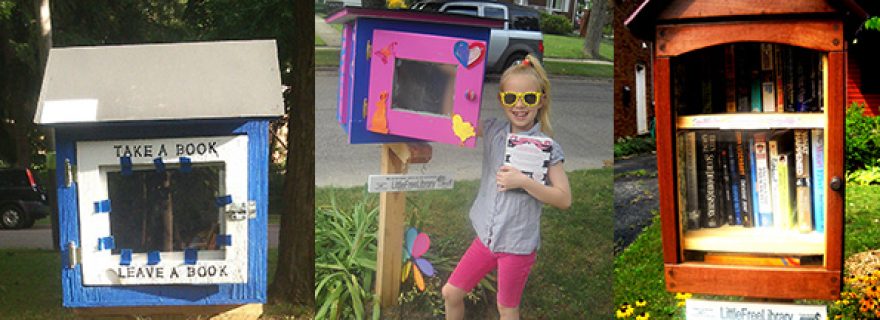
15 Comments
@Henrike. Interesting question, as you put it: "what do anthropologists make of these Little Free Libraries? May I suggest some further information which I dug out six years ago? In 2012 newspapers reported the appearance of these little free libraries. I had just retired as a librarian and this topic was right up my alley. To document this new library phenomenon I started a blog series (in Dutch) under the heading "de informele bibliotheek" (the informal library). Part 1 is here: https://www.jodoc.nl/informatie-bibliotheken/de-informele-bibliotheek-1/. Last part 13 is here: https://www.jodoc.nl/informatie-bibliotheken/de-informele-bibliotheek-13-groningse-ruilbibliotheken/
Since 2015 it seems to me that mini-libraries, wether officially LFL registered or completely anonymous, have become accepted lifestyle accessoiries or elements of neighbourhood activities. Most interesting project that I came across was the "Leeszaal Rotterdam-West", website: http://www.leeszaalrotterdamwest.nl/. Initiators Maurice Specht and Joke van der Zwaard wrote a book on this project: De uitvinding van de Leeszaal (2014). ISBN 9789078088967 .
Thanks for the additional locations you pointed out, @R Palthe @Isabel Vissers! It's great to hear from people who've put up these little libraries in different places. @Lieke, yes, I agree the model has definite potential to work in a variety of contexts, and I'm excited to know that this includes low-income communities in the US.
I have got a mini bieb in Meppel. There are three in our town. On holliday I discovered one in Sint Antonin de Nobleval in France. They are all over the place. Also "kinderzwerfboekstations", simmilar to bookcrossing.com
You can find a lot of little free libraries on www.minibieb.nl
I have a little free library myself in Roggel (Limburg): www.facebook.com/minibiebroggel
Hi Henrike, I don't fully agree with you that 'libraries constitute a small-scale and probably mostly middle-class phenomenon' - although there are more libraries in the US and Europe, they also exist in 3rd world countries and are actually quite successful there, as well as thriving in poorer neighbourhoods in the US for example - especially because it is such an accessible, cheap, easy and DIY way to share books and spread literacy. If you want more data, you can check the LFL world map, or The Little Free Library Book by Margret Aldrich, although many initiatives in poorer countries are not recorded as well through internet.
@Floor: Oh, geo caching, another connection I hadn't heard of before! Maybe you should write your next blog post about geo caching.
Hi Henrike! Yes I did see little free libraries in Leiden. At least one of them is a hiding place for a Geo Cache as well!
@Janet: sounds cool, I should check it out when I'm back in Leiden!
Also, somebody from Germany emailed me about the Little Free Libraries there, and since this was such an interesting comment, I asked for permission to share it here. Permission granted, here's the story:
"In Dortmund they have these little libraries too. There it is something established amongst the political active youth, alternative scene, or younger grown-ups, so that you can mostly find books about anarchism or the communist manifesto for example, and also novels regarding that matter. Actually one of them has grown so much, that they had to expand it and it is now a little cafè where you can bring, get a book, or stay there reading and chatting with others which is as well quite common, but it developed out of this little book shelves!
BUT here is another interesting aspect which I was able to investigate by calling a friend who lives in Dortmund. Apparently, the place supports the search for dating partners. Standing in front of the book shelf, searching for something, or reading the contents makes it easier to get into contact and start a conversation with people who are there as well. I wonder why..maybe because it is such a sneaky way of starting a conversation or showing interest..hidden in a conversation about books..."
I can definitely see this work out! Very cool!
The Boekenzolder, here in Leiden, has thousands of books which we give away free. People bring books in and anyone can come and take a number of books home, to read, give away or bring back later. Volunteers collate and organise the books, which are in many languages and cover many topics. We depend on subsidies and donations to cover the rental costs. Please see:
http://www.boekenzolderleiden.nl/
The Book Crossing organisation has a branch in Leiden, in the Doelen hotel. Books are ‘released’ and those who ‘catch’ them can track their further travels:
http://www.bookcrossing.nl/obcz.php
Fonds 1818 also provides a kit for those who want to make their own ‘mini-bieb’:
http://minibieb.nl/minibieb1818/
I hope readers of your blog will try these out!
@Bart: yes, I think some of these are geared to children. I would say that in my neighborhood, where there are now 15 of these libraries, there are 5 that are entirely children's books, 5 are geared to adults, and 5 are mixed. I wonder if this will change over time. So far, my kids and I have been kind of strict of putting a children's book back if we take a children's book, and a grown-up book when we take that. (We even try to match the age/reading level for the children's books)
@Erik: I think a bus stop is a great place for these: lots of traffic, lots of people waiting around--and nice to get an influx of books from different places, if people who've gotten off the bus also sometimes leave books!
Thank you all for your comments! @Noor: I'd love to see a tree-shaped library! I hadn't yet heard about the environmental aspect of the little free libraries, but I can definitely see the connection. Somebody else from Germany also commented (in an email to me) that in some cities in Germany there are little free libraries that aren't in what I called "safe" neighborhoods, so I want to note that for the record, too.
@Marieke: thanks for the link! I saw on their website that they were up to 250 "minibiebs" now (apparently there's a project for people with disabilities to make these libraries--what we call in Dutch "sociale werkplaats." Never knew about that connection, either!)
Thank you Henrike, for your inspiring blog. Just want to tell you that in Berlin and some other German cities (e.g. Cologne) these libraries sometimes take the shape of trees, which might be an allusion to another function of these libraries: to save paper and trees!
Very recognizable blog Henrike!
In my hometown, the first 'neighborhood library' founded last summer. The owner put her mini-library on the Dutch website: http://minibieb.nl/. There seems to be a shared sense of community, right? Would be interesting to explore that topic too.
Great piece Henrike on what is a fascinating phenomenon. There is quite a number of Little Free Libraries here in the Houtwijk neighbourhood I am living at in Den Haag. Will make some pics for you and post them here or elsewhere, but what I know is that two of the libraries nearest to home are run by 'Montessori school parents' and my impression so far is that these libraries go for children books (but I will do some ethnographic check on this) or it is at least children like my daughter who are most keen on bartering books. So big hopes for the tablet generation ; )
Thanks for your blog Henrike. The first time I saw this was in Brasília, a few years ago. The books and magazins were kept at the bussstop.
Add a comment